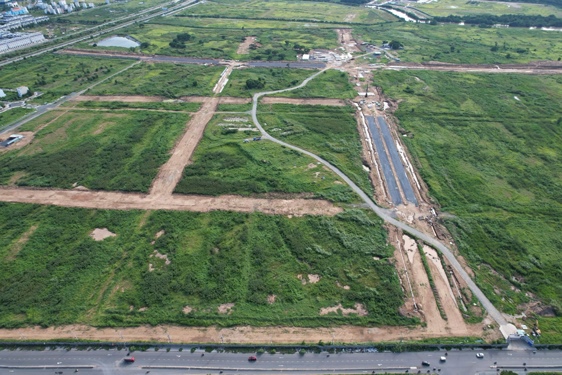During a constituent meeting in Hanoi ahead of the 10th session of the 15th National Assembly on September 30, General Secretary To Lam dedicated significant time to discussing land issues. He highlighted that while the state regulates prices for gasoline, electricity, and numerous other commodities, land prices are left to councils and consulting firms to determine based on market rates. This has led to market manipulation, price inflation, and hardships for citizens.
Numerous Inefficiencies in Land Management
The General Secretary pointed out that small, irregularly shaped plots of land, often unusable, are auctioned off at exorbitant prices by land speculators. This drives up prices for adjacent land, spanning thousands of hectares. He emphasized that amendments to the Land Law and Planning Law must ensure efficient and equitable land use.

A plot of land in the outskirts of Ho Chi Minh City now sells at a significantly higher price compared to a few years ago. |
In recent years, several high-profile cases have served as costly lessons. Notably, in 2025, Pham Ngoc Tuan bid 30 billion VND per square meter for land in Soc Son (Hanoi), hundreds of times the actual value of 40 million VND per square meter. After winning the auction, he forfeited the deposit and was sentenced to three years in prison for violating auction regulations. Similarly, in Thanh Oai (Hanoi) earlier this year, speculative price inflation occurred when 54 plots totaling over 4,400 square meters were bid up to double their starting price. Subsequently, numerous investors forfeited their deposits, further destabilizing the market.
Beyond land prices, housing markets in several localities, particularly Hanoi and Ho Chi Minh City, have experienced unprecedented price surges.
Various factors have been identified, including speculation, price manipulation, limited supply due to prolonged legal issues, and delays in determining land use fees, all of which inflate investment costs and final sale prices.
Vo Huynh Tuan Kiet, Director and Head of Residential Project Marketing at CBRE Vietnam, attributed the surge to significant changes following Ho Chi Minh City’s consolidation into a megacity. Infrastructure development, particularly metro systems, ring roads, and transit-oriented development (TOD) models, has attracted substantial foreign investment. “However, combined with land price adjustments and real estate tax policies, the market has established a new price baseline, especially in suburban areas,” Kiet analyzed.
Establishing a National Standard Land Price Framework
Land prices significantly impact the real estate market and the broader socio-economic landscape. Unreasonable fluctuations, speculation, and vested interests have distorted the market, burdening both citizens and businesses. Experts argue that a transparent, scientific, and unified mechanism is essential to align land prices with their true value, fostering sustainable development.
Dr. Nguyen Si Dung, former Vice Chairman of the National Assembly Office, advocates for a national standard land price framework. “An independent national land valuation council should be established to set prices based on comprehensive data, expert consultation, and rigorous oversight. Allowing local authorities to determine prices independently poses significant risks of vested interests,” he stressed.
Concurrently, developing a unified national land database is imperative. This system must record all transactions, tax information, and credit data in real time to accurately reflect supply and demand and eliminate speculative transactions.
Dr. Dung also recommends implementing anti-speculation taxes, progressive taxes on idle land or short-term transactions, and rigorously enforcing mechanisms to capture land value increments resulting from public infrastructure investments. He suggests allowing civil transactions to deviate from state prices within a reasonable range but with a cap to balance flexibility and stability.
Defining a Land Use Strategy
Dr. Pham Viet Thuan, Director of the Institute for Natural Resources and Environment Economics in Ho Chi Minh City, noted that the new land price schedule under the 2024 Land Law has revealed significant shortcomings. “Within a year, new land prices increased by 2.3 to 38 times compared to pre-law levels. Additionally, Decree 103/2024, requiring 100% tax payment when converting land to residential use, has overwhelmed citizens, leading to revenue shortfalls and broader socio-economic impacts,” he cited.
He attributed these issues to the flawed methodology outlined in Decree 71/2024 for establishing land prices and called for adjustments. “Determining a land use strategy within macroeconomic regulation is crucial. Therefore, land prices should remain stable within provinces and cities, with a coefficient K applied for adjustments.
Theoretically, coefficient K is a state land management tool that limits price fluctuations. The revised Land Law should stipulate that the new price schedule, effective January 1, 2026, be based on pre-law prices, with adjustments of 3%-5% using coefficient K. This approach will contribute to long-term macroeconomic stability,” Thuan proposed.
He emphasized that land, as a production and service resource, must be priced to encourage investment and job creation. Curbing speculation is essential, as combating land waste is key to national prosperity. Instead of raising land prices, the state should consider land use fees and urban infrastructure charges for more sustainable revenue.
|
Developing Housing for Genuine Needs Dr. Nguyen Van Khoi, Chairman of the Vietnam Real Estate Association, emphasized that developing housing for genuine needs is the only sustainable solution, rather than allowing the market to be driven by speculation. He stated, “Incentives and special mechanisms for social housing and mid-range commercial housing projects should be enhanced, and high-end inventory should be flexibly converted to affordable housing to prevent resource wastage.” Khoi also called for simplified legal procedures, transparent planning, especially during administrative mergers, to provide businesses with a foundation for long-term investment. He highlighted the need to mitigate risks from delayed infrastructure projects, which significantly harm citizens. He proposed establishing a National Housing Fund and Local Housing Funds to provide capital support, regulate supply and demand, and develop rental housing. Public-private partnerships (PPPs) should be encouraged for social housing and satellite infrastructure. Simultaneously, mechanisms to monitor and control speculation and price manipulation must be tightened to ensure “sustainable assets” for citizens. |
Article and Photo: SON NHUNG
– 08:59 02/10/2025
Chief Justice Lê Minh Trí: Ongoing Land Law Revisions to Ensure Efficiency, Fairness, and Reasonableness
Chief Justice of the Supreme People’s Court Lê Minh Trí announced that the Politburo has directed further review and amendment of the 2024 Land Law to better align with practical realities and address emerging issues.
Unveiling the Billion-Dollar Signatures: A Glimpse into the Signatures of Real Estate Titans and Leading Ladies
Behind the signatures of real estate industry leaders lie billion-dollar decisions, paving the way for large-scale projects and transformative urban developments that redefine market landscapes.
Sunshine Group Post-Restructuring: Second-Highest Market Cap in Real Estate, Full-Year Profit Projected at VND 14,000 Billion, Surpassing Shareholder Meeting Targets
With post-tax profits for 2025 projected to reach approximately VND 14,000 billion, an 18-fold increase from the previous year, Sunshine Group is poised to achieve a groundbreaking growth surge, driven by its comprehensive restructuring efforts. This remarkable trajectory underscores the exceptional effectiveness of the Group’s strategic focus on large-scale economic consolidation and ecosystem integration.













































